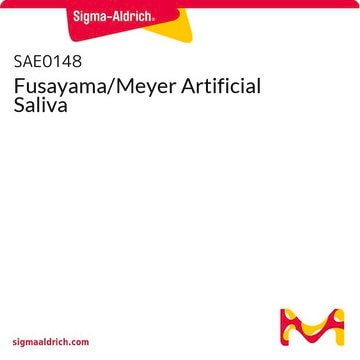SAE0149
Artificial Saliva for Pharmaceutical Research
Synonym(s):
Artificial Saliva Solution, Saliva Substitute
Sign Into View Organizational & Contract Pricing
All Photos(1)
About This Item
UNSPSC Code:
51241229
NACRES:
NA.25
Recommended Products
shipped in
wet ice
storage temp.
2-8°C
General description
Artificial saliva helps in gaining a stable environment and standardized procedures for in vitro and in vivo studies in pharmacological and bioengineering fields. This saliva mimics the properties of natural saliva in terms of chemical composition and physical characteristics. Artificial Saliva is formulated according to literature for pharmaceutical research such as studies of drug dissolution and drug delivery through the oral mucosa.
Application
Artificial Saliva for pharmaceutical research has been used:
- to study the antifungal activity of Candida albicans on the surface of printed denture resin discs
- as a diluting agent for inactivation of Escherichia coli in droplets are with different ambient humidities
- to determine the stability of graphene oxide-amoxicillin (GO-AMOX) capsules
Components
Sodium Chloride
Potassium Phosphate Monobasic
Potassium Chloride
Potassium Thiocyanate Urea
Potassium Phosphate Monobasic
Potassium Chloride
Potassium Thiocyanate Urea
Storage and Stability
This is a ready to use formulation that should be stored refrigerated.
Storage Class Code
12 - Non Combustible Liquids
WGK
nwg
Flash Point(F)
Not applicable
Flash Point(C)
Not applicable
Certificates of Analysis (COA)
Search for Certificates of Analysis (COA) by entering the products Lot/Batch Number. Lot and Batch Numbers can be found on a product’s label following the words ‘Lot’ or ‘Batch’.
Already Own This Product?
Find documentation for the products that you have recently purchased in the Document Library.
Inactivation of Escherichia coli in droplets at different ambient relative humidities: Effects of phase transition, solute and cell concentrations
Liang Z, et al.
Atmospheric Environment, 119066-119066 (2022)
Sol Jeon et al.
Journal of dentistry, 120, 104098-104098 (2022-03-25)
To produce three-dimensionally (3D) printed removable denture bases with antifungal activity using microencapsulation of phytochemicals that inhibit Candida albicans growth. Two types of phytoncide oil extract A and B were micro-encapsulated. The phytoncide-filled microcapsules were mixed with denture base resin
J J Pytko-Polonczyk et al.
Journal of physiology and pharmacology : an official journal of the Polish Physiological Society, 68(6), 807-813 (2018-03-20)
Examination of dental materials and their properties at the initial stage of the digestive process requires the development of conditions that mimic the environment of the oral cavity. One of the main components of this area is saliva, where many
Anna Trusek et al.
Materials (Basel, Switzerland), 14(12) (2021-07-03)
Graphene oxide (GO) was proposed as an efficient carrier of antibiotics. The model drug, amoxicillin (AMOX), was attached to GO using a peptide linker (Leu-Leu-Gly). GO-AMOX was dispersed in a hydrogel to which the enzyme responsible for releasing AMOX from
Our team of scientists has experience in all areas of research including Life Science, Material Science, Chemical Synthesis, Chromatography, Analytical and many others.
Contact Technical Service








